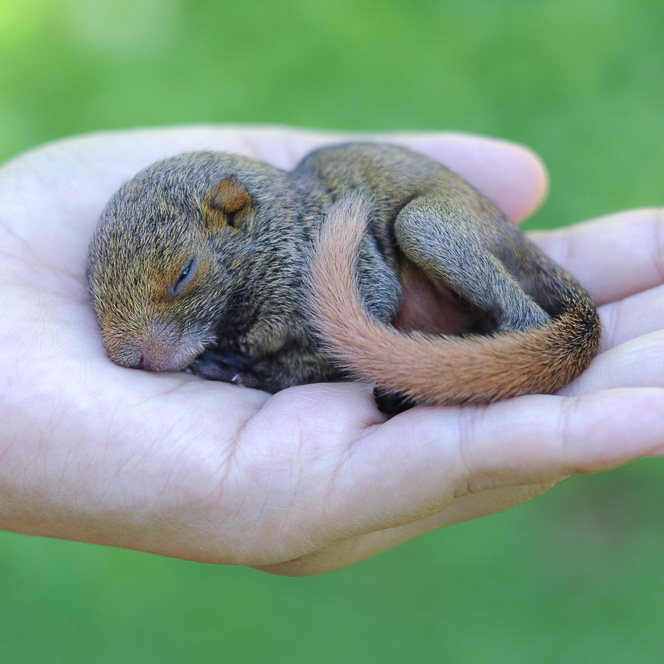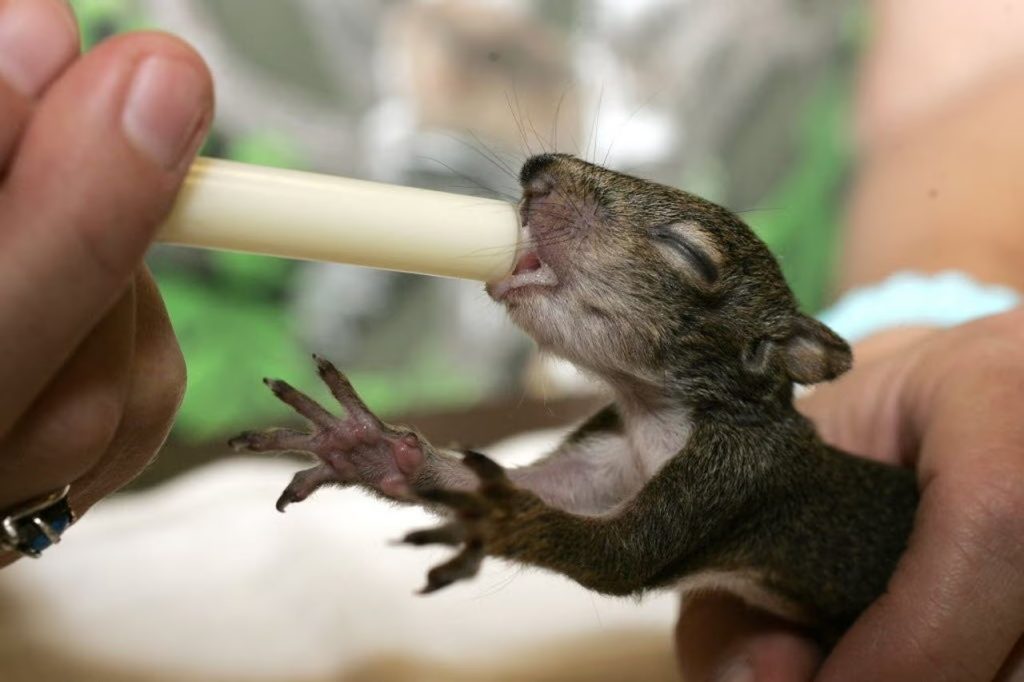How Long Can Baby Squirrels Live Without Their Mother? Rescue Guide
How long can baby squirrels live without their mother? Baby squirrels only live up to 24 hours without their mother as they fully depend on mothers for food, warmth, and protection.
Though squirrels are independent creatures, baby squirrels require intensive mother care as they are blind, furless, and deaf while born. Due to these reasons, it becomes hard for baby squirrels to survive without their mother. If you find an orphan baby squirrel, we suggest calling a local wildlife rescue group than rehabilitating it at home.
Want to know more about baby squirrels? Go through our guide for detail to take care of the orphan baby squirrel properly.
How Long Can Baby Squirrels Live Without Their Mother

Newborn squirrels can’t live more than a day without their mother. In fact, baby squirrels drink only their mother’s milk for 6 to 10 weeks, depending on the species.
On top of that, baby squirrels can’t walk until six weeks old, making them entirely helpless without a mother. Besides, the eyes of babies open when they become four weeks old. As a result, baby squirrels require complete protection from their mother to survive.
Further, baby squirrels don’t have fur and require at least 3 to 4 weeks to see fur growing. In the duration, these babies can thermally regulate and need the mother to keep them warm. Also, baby squirrels are incredibly susceptible to the cold. Without the help of a mother, they can die in a few hours from severe hypothermia.
How Long Can Baby Squirrels Live Without Eating?
Baby squirrels can live 12 to 24 hours without eating. From born to 6 weeks, baby squirrels only drink their mother’s milk. Even they require to feed every 3 to 4 hours.
In addition, baby squirrels can’t digest other foods like fruits, seeds, or nuts until they are 8 weeks old. Hence, these babies don’t have any nutrition sources to survive. If baby squirrels aren’t receiving nutrition from their mothers for 12 hours, it becomes hard for them to survive.
While dealing with orphan squirrels, caregivers should give Pedialyte and puppy milk as soon as possible to save them from starving. Otherwise, the baby squirrel may die due to starvation.
What Can A Baby Squirrel Eat?

A baby squirrel’s diet comprises mother milk, nuts, vegetables, and fruit. Newborn squirrels drink only their mother’s milk for 6 to 10 weeks. It is a must for baby squirrels to develop a healthy immune system and ensure better growth.
If you get an orphan squirrel, we suggest giving Pedialyte and puppy milk as soon as possible. But avoid soya milk, goat milk, or cow milk as these formulas cause dehydration and baby squirrels may die due to starvation.
After 6 to 10 weeks of bottle-feeding, baby squirrels can try nuts, vegetables, and fruit. Try with slices of strawberry, grapes, watermelons, or apples to offer them an enjoyable treat. Next, nuts like hazelnut, walnut, pistachios, pine cones, almonds, and cashews can serve squirrels to secure a rich diet.
Moreover, give squirrels sprouts, pumpkin, and pine seeds to ensure a tasty and low-calorie treat. Also, baby squirrels love to eat vegetables, including eggplant, carrots, squash, reddish, beans, cabbage, peas, and tomatoes.
What To Do If I Find a Baby Squirrel Alone?
Baby squirrels often fall from nests or face accidents. If you find a squirrel in the backyard, try to reunite the squirrel with the mother first. Mother squirrel will come to rescue her baby within a few hours. Hence, it is better to avoid scooping up the squirrel in hand to rehabilitate.
If you inspect any injuries or issues with the orphan squirrel, MidAtlantic suggests contacting your local wildlife rehabilitator. They can take proper care of the squirrel by feeding it proper milk or keeping it warm to prevent hypothermia. Then, you can place the squirrel in the lost place with heat sources and check whether the mom has found the baby.
Sometimes the mother squirrel thinks the lost baby may become sick or die. If the mother squirrel doesn’t retrieve the baby, don’t bring it home. We suggest calling a wildlife rehab group, as baby squirrels require intensive survival care.
How Often Should I Feed Baby Squirrels?
It depends on the age of the baby squires, newborn babies require feeding every 3 to 4 hours, whereas younger ones require feeding every 5 to 6 hours.
Now, newborn babies are too sensitive to nutritional requirements and only drink their mother’s milk. including overnight, these babies require continuous feeding for up to 6 weeks. Once their digestive system develops, they can eat nuts, fruit, and vegetables independently.
In the earlier stage, baby squirrels require feeding every 5 to 6 hours. If you find a squirrel and don’t know the feeding frequency, we suggest contacting the nearest animal veterinarian for feeding frequency and diet plans to save them from starving.
How Can I Reunite Baby Squirrel With Its Mother?
Due to the high susceptibility to the cold, baby squirrels can die in a few hours from severe hypothermia. When you find a baby squirrel, place it in a box filled with soft blankets. Next, put a heat source like a rice bag inside the box to ensure warmth for the baby.
To make a heated rice bag, insert rice grains into a sock and microwave the sock for a few seconds. Then, warp the bag into the blankets to give the baby a proper heat source. You can use heating pads but keep them on low settings.
On top of that, keep a little space in the box as it can move to another corner to avoid excess heating. Finally, keep the box on the trunk or base of the tree and check whether the mother retrieves the baby. If not, call the wildlife rehab group to take the orphan squirrel.
Warp Up
Baby squirrels can’t live more than a day without their mother. Besides, they require intensive mother care as baby squirrels are blind, furless & deaf while born and only drink their mother’s milk for 6 to 10 weeks.
If you find a squirrel, wait for the mother squirrel to rescue her baby. Also, avoid scooping up the squirrel in hand to rehabilitate. If the mother squirrel doesn’t retrieve the baby, call wildlife rehab groups for rescue and intensive care.
